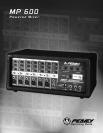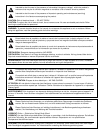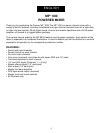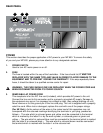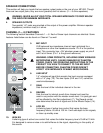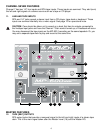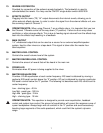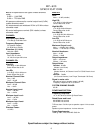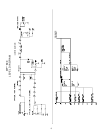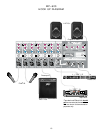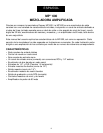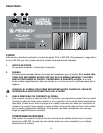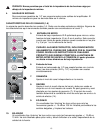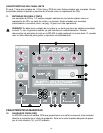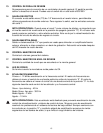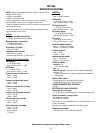
13. REVERB FOOTSWITCH
Provided for connection of the optional remote footswitch. The footswitch is used to
activate/defeat the reverb. You may use the ON/OFF single-button switch #0051000.
14. EFFECTS OUTPUT
Plugging into this mono (TS) 1/4" output disconnects the internal reverb, allowing you to
utilize external effects devices. In order to return the signal from the external effects unit, use
the summing inputs of Channel 7.
OPERATION NOTE: When using Channel 7 as an effects return, it is important that you turn
the Channel 7 Reverb control all the way down (“0” position). Failure to do so may cause
oscillation or other strange effects. This is due to feeding signal returned from the effects loop
back into the effects loop resulting in a feedback.
15. MAIN OUTPUT
1/4" unbalanced output that can be used as a source for an external amplifier/speaker
system, feed to other mixers or a tape deck. This signal is taken after the master four-
band equalizer.
16. MASTER LEVEL CONTROL
Controls the overall volume level of the system.
17. MASTER REVERB LEVEL CONTROL
Controls the amount of reverb that will be heard in the main mix.
18. POWER LED
Illuminates when AC power is being supplied to the mixer.
19. MASTER EQUALIZATION
Provides ±12 dB equalization at each center frequency. EQ boost is obtained by moving a
particular EQ band’s control above the “0” position. EQ cut is obtained by moving a particular
EQ band’s control below the “0” position. The following list describes each EQ control and its
center frequency.
Low - shelving type - 40 Hz
Low Mid - peak type - 300 Hz
High Mid - peak type - 2 kHz
High - shelving type - 10 kHz
OPERATION NOTE: This equalizer is designed to provide room equalization, feedback
control and system tone control. No amount of equalization will correct the response curve of
a poor loudspeaker. Always begin with all controls in the “0” position and avoid excessively
boosting large segments of the audio passband, which could limit the system’s dynamic
range.
7



